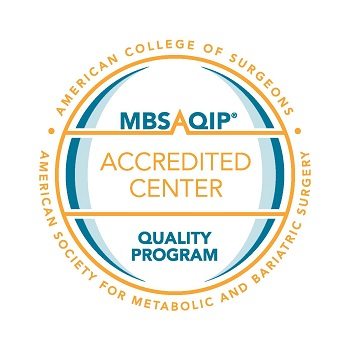 Samaritan Hospital Bariatrics has received Comprehensive Center accreditation from the Metabolic and Bariatric Surgery Accreditation and Quality Improvement Program (MBSAQIP). The national accreditation is reserved for bariatric care programs that meet the highest standards for patient safety and quality of care.
Samaritan Hospital Bariatrics has received Comprehensive Center accreditation from the Metabolic and Bariatric Surgery Accreditation and Quality Improvement Program (MBSAQIP). The national accreditation is reserved for bariatric care programs that meet the highest standards for patient safety and quality of care.
MBSAQIP is a joint program of the American College of Surgeons (ACS) and the American Society for Metabolic and Bariatric Surgery (ASMBS). As an MBSAQIP accredited center, Samaritan Hospital Bariatrics ensures bariatric surgery patients receive a multidisciplinary program, which improves patient outcomes and long-term success. Additionally, Samaritan Hospital Bariatrics offers preoperative and postoperative care designed specifically for their severely obese patients.
“We are proud of the entire Samaritan Hospital Bariatrics team and congratulate them for receiving this important accreditation from MBSAQIP,” said Norman Dascher Jr., president of Samaritan Hospital and St. Mary’s Hospital, both affiliates of St. Peter’s Health Partners. “This accreditation is an outstanding recognition of our bariatric team’s dedication to excellence in bariatric care, and another example of how St. Peter’s Health Partners continues to grow and transform health care in our community.”
Samaritan Hospital Bariatrics’ commitment to quality care begins with appropriately trained staff and surgeons who participate in meetings throughout the year to review outcomes. The team seeks continuous improvement to enhance the structure, process and outcomes of the center.
To earn the MBSAQIP designation, Samaritan Hospital Bariatrics met essential criteria for staffing, training, and facility infrastructure and protocols for care, ensuring its ability to support patients with severe obesity. The program also participates in a national data registry that yields semiannual reports on the quality of its processes and outcomes, identifying opportunities for continuous quality improvement. The standards are specified in the MBSAQIP Resources for Optimal Care of the Metabolic and Bariatric Surgery Patient 2016, published by the ACS and ASMBS.
After submitting an application, centers seeking MBSAQIP accreditation undergo an extensive site visit by an experienced bariatric surgeon, who reviews the center’s structure, process, and clinical outcomes data.
Following their site visit, MBSAQIP surveyors highlighted how Samaritan Hospital Bariatrics achieved accreditation in less than two years – much faster than most other programs.
In the United States, around 15.5 million people suffer from severe obesity, according to the U.S. National Institutes of Health, and the numbers continue to increase. Obesity increases the risks of morbidity and mortality because of the diseases and conditions that are commonly associated with it, such as Type 2 diabetes, hypertension, and cardiovascular disease, among other health risks.
Studies have shown metabolic and bariatric surgical procedures have to be effective in the reduction of comorbid conditions related to severe obesity. Working with ASMBS, the ACS expanded this quality program for bariatric surgery centers so that it can assist bariatric patients in identifying those centers that provide optimal surgical care.
Click here to learn more about Samaritan Hospital Bariatrics. The program offers free informational seminars every month to discuss the health risks of obesity, the different types of surgical procedures, potential risks and complications of surgery, and surgical outcomes.
Click here for more information about American Society for Metabolic and Bariatric Surgery, and click here for more information about the American College of Surgeons.





